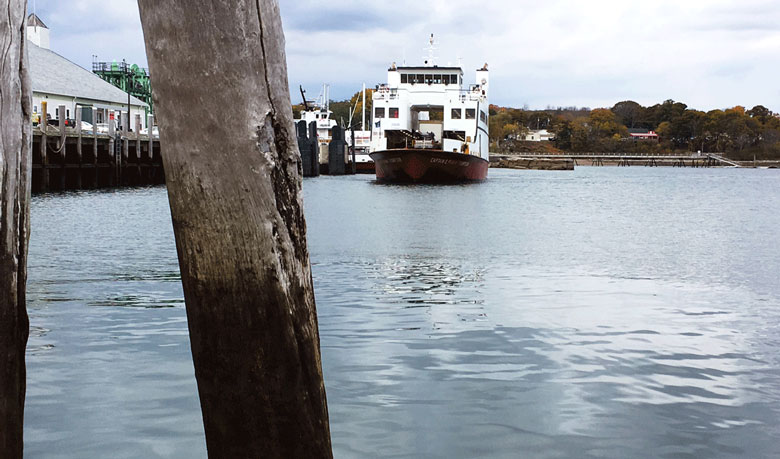The Maine State Ferry Service is proposing a 18.3% hike in ferry passenger and vehicle fares, citing inflation’s impact on wages, fuel, and vessel repairs.
A fare hike was adopted in 2019, finalized only after significant opposition from residents of some the islands that faced especially high fare adjustments. The final rates were amended and won acceptance from most island communities.
The state ferry service, part of the Department of Transportation, serves Frenchboro, Swan’s Island, Islesboro, North Haven, Vinalhaven, and Matinicus.
The new rate proposal, or tariff, continues a tradition of higher rates during the summer months. It also shifts some of the burden of the hike onto trucks.
By law, the ferry service is supposed to be funded in a 50/50 split between the state highway fund and fares and fees. In some recent years, the highway fund has borne more than that 50%, which has prompted changes, including eliminating the discount for tickets purchased on islands.
Geary cited higher costs for diesel fuel, parts, supplies, contractors, and staff.
DOT pays all of the cost of new boats and port improvements.
A public hearing at which public comment was sought on the proposed tariff was held at the Samoset resort in Rockport on March 12. Ferry service director Bill Geary, a Vinalhaven native who now lives in Rockland and who studied at Maine Maritime Academy and served in the Navy, opened the hearing by outlining his emphasis.
“My top priority since coming on has been to build a strong collaborative relationship with all the communities we serve,” he said.
“Since 2019, Maine DOT has spent over $79 million in state and federal funds on the Maine State Ferry system,” including operational and capital costs like new vessels. “No increase is easy, but as I’m sure you’re all aware, the cost of just about everything has gone up.”
Geary cited higher costs for diesel fuel, parts, supplies, contractors, and staff. The service has begun offering recruitment and retention bonuses and creating stipend positions to address what he said was a global shortage in mariners.
The goal, he said, is to establish prices so another adjustment isn’t needed in at least four years. The 18.3% increase will help the service “keep up with the 50% split,” he said.
An early draft of the new tariff raised more revenue by hiking rates during the warm-weather months. Then, at DOT Commissioner Bruce Van Note’s suggestion, the rates paid by trucks was raised, with Van Note arguing that trucks took up space on the boats.
Finally, after input from islanders through the ferry advisory board, a blending of the two approaches was drafted.
At the hearing, ferry advisory board member Duncan Bond of Frenchboro said his island residents “find this reasonable and not a burden for us.” Eva Murray, the board’s representative from Matinicus, echoed that view and thanked the service for taking into consideration her island’s special needs.
Advisory board chairman Jon Emerson of North Haven said his community wanted a return to reduced rates for islanders.
In 2019, ferry officials said regular travelers, such as commercial truck drivers, would buy a one-way ticket on the mainland, then buy the reduced round-trip tickets at the island terminal for the rest of the summer. Emerson suggested than an island residency card might fix that problem. He also suggested senior rates, and expressed worry that higher rates for trucks would mean higher costs for consumers on the island.
Alan Barker, the Vinalhaven representative to the advisory board, argued that trucks would disproportionately bear the rate hike. Currently, during off-peak months, a 62-foot truck took up about three car spaces on the boat but would pay the amount that eight to nine cars paid. Under the proposal, that truck would cost the amount that 9.3 cars would pay.
“That’s a huge increase,” he said.
Karen Mundo of Islesboro said her husband recently had surgery and would have to travel to the mainland, often at $52.50 under the new tariff, a financial burden. She suggested a senior rate be established.
Islesboro’s Maggy Willcox, publisher of the Islesboro Island News, read a letter from resident John King, which suggested island resident, senior, and commuter rates be added. With just 600 year-round residents, King argued, a reduced rate wouldn’t impact revenue.
Roxanne Tolman, representing the Vinalhaven Fishermen’s Coop, said the island had a much higher percentage of truck traffic on the ferry, and so would be impacted.
“That’s how we get our lobster off the island. That’s how we get our bait on the island,” she said.
The proposed rate hikes for a round-trip vehicle for Frenchboro, Swan’s Island, North Haven, and Vinalhaven go from $38.50 to $48.50 in the June 1-Sept. 30 peak season, and $31 to $36.50 during the Oct. 1 to May 31 period.
For a round-trip vehicle trip for Islesboro, the rates increase from $29.50 to $37.50 during peak season, and from $22 to $26 during the colder months.
For Matinicus, the rate for a round-trip vehicle, with a reservation, would go from $90 to $108, regardless of the time of year.
Truck rates for Frenchboro, Swan’s Island, North Haven, and Vinalhaven would increase during peak season from $4.75 per foot length to $6.25.





